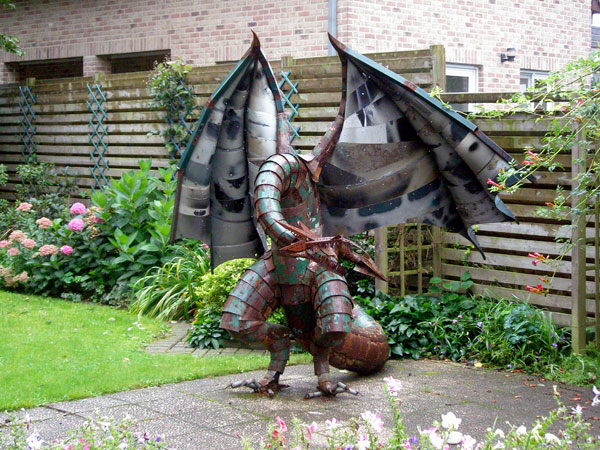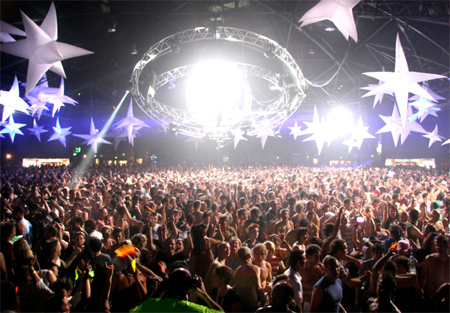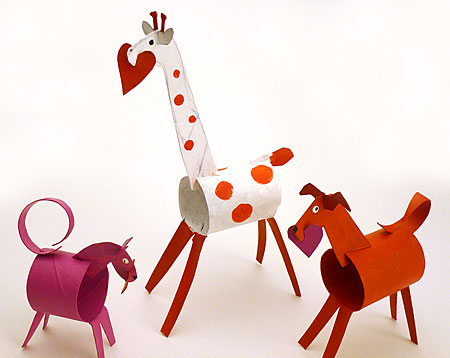Monthly Archives: February 2012
Weekly Recycle News
This week’s recycled news sourced from around the net, bought to you by Recycled Market
* An article found on www.instructables.com, to upycle a cassette boom box into general purpose amplified speakers.
* An idea seen on Environmental Media Association, instead of throwing out old whisks, upcycle them into decorative lights
Video sourced here
* An article on Whittier Daily News on the rise of criminal recycling
* Hermit crab, recycled home.. seen here
* The Grand Canyon to ban bottled water sales
* A dragon made of scrap metal, as seen on Recyclart
 * Lastly, a necklace made from recycled paper, made by LaAlicia, as seen on Recycled Market!
* Lastly, a necklace made from recycled paper, made by LaAlicia, as seen on Recycled Market!
Interview with Recycle Craft Trainer Megan Bayliss of The Junk Wave
It is with pleasure to interview eco-entrepreneur Megan Bayliss, the brains behind social enterprise The Junk Wave. Megan, a recycled craft guru, is a true inspiration, she offers professional recycled craft workshops, which have extended across Australia, and will soon be making their way to international shores.
Q. Can you tell us about what you do, and the ideas behind The Junk Wave?
Sure. In a nut shell, I train people to do craft with recycled material: material from their home that might otherwise get thrown into landfill. Post-consumer waste is such a valuable resource; it seems a shame to throw it when people could be using it in creative ways.
The Junk Wave was born to collet post-consumer junk from people, to cleanse and process it into craft ready material and to train early childhood educators, youth workers, teachers, etc how to use it as a resource in their programming. But, it became popular with Mums, kids and Grandma’s too so the trainings became workshops open to anyone interested in learning how to make things out of their post-consumer junk.
My workshops include an hour of theory on sustainability, gyres and plastic. They are also RPL compliant (see this document for a list of courses) and interested participants take away evidence required for their training organisations.
The Junk Wave is far from a traditional business model. It is a sustainable social enterprise that measures its worth against a triple bottom line:
- Good for the environment
- Good for people
- Good for finances.
Each of these things are equally important to me. My accountant husband says that finances are the bottom line and cash is king. Bah humbug….I think of my profit, my social capital, being measured against what I do for the environment, what I do for people AND what I have in my bank.
A social enterprise is an organization that applies business strategies to achieving philanthropic goals: a business that trades for a specific social, environmental or cultural purpose. The Junk Wave’s purpose is to keep junk out of landfill and oceans so that we can have a cleaner environment for our children. We do that by crafting junk and getting people to think of their waste as a resource rather than trash.
Q. Why is recycling important to you?
Our waste is killing our oceans. I was born and grew up in Papua New Guinea. When I was 13 my family moved back to Australia and settled in Cooktown. I was a coastal child. I spent much time building leisure activities and social participation around the beach and the ocean. I now live in Cairns, right on the Great Barrier Reef and the coast is my life.
As I grew-up, I saw the growing influence of junk on beaches and ocean life. It concerned me because I instinctively knew that rubbish in the ocean would change our way of life. Now after much learning I fully appreciate the science behind recycling, particularly plastics, and that post-consumer rubbish in landfill and ocean are poisoning our children’s future.
When my first grandchild was born I wanted to ensure that she grew in a world where she could experience an ocean life that includes living fish, birds, dolphins and seahorse rather than dead sea-birds full of plastics or pictures in books of animals that existed in my time.
Q. Where do you look for your creative inspiration?
I have an active and creative mind. Often a piece of junk will remind me of something so I go ahead and craft it. I also constantly think of how a new item can be alternatively made from junk: similar to those magazine spreads that suggest a budget wardrobe that achieves a designer look. I LOVE sites like pinterest and Recycled Market for idea stimulation and I work with an amazing young woman, Jess, who thinks of things that I don’t. Collective thinking and diversity breeds innovation and that is my biggest inspiration.
Q. What advice would you give to anyone that might be interested in becoming more sustainable?
For those who haven’t yet ventured into a sustainable way of life, use everything at least twice (yes, that includes your plastic milk bottles and food packaging). For those who are already comfortable with ideas of sustainability, put a REFUSE before the other four R’s: Refuse, reuse, remake, reduce, recycle last. Learn a definition of sustainability that becomes a life creed: Is it good for the environment, for people and for finances.
Q. What is on the horizon for The Junk Wave?
The sale of The Junk Wave hobby/business chapters throughout Australia, and then internationally in 2014. I am travelling my workshops more: from one end of Australia to the other. My travel is not sustainable and adds emissions to an already over stressed environment. Rather than do this, I am selling The Junk Wave hobby business chapters to interested and motivated parties all around Australia (only one person per geographic area) so that they can capitalise on training requests and referrals in their area. The chapter owners keep 100% of the income generated by them and through my referral to them. They can run their business however they want (I workshop; someone else may want to do markets, school talks, sell directly to early childhood centers, etc) but they get training and support from me, their own The Junk Wave website built on my platform which gives them instant seo, rankings and indexing and they capitalise on the data base and social media relationships I have built up….all without any of us adding travel emissions to the environment.
Q. When and where is your next Junk Wave workshop?
Bags, beads and bowls
Sydney March 3rd
Melbourne March 11th
Adelaide (dates are being discussed)
Darwin April
Thank you Megan, we can’t wait to meet you in person!
Recycled maps in a digital age
As we immerse ourselves into a digital age, with satellite navigation systems in our cars, and GPS mobile phone tracking in the palm of our hands, how much time do we have until paper maps and atlases become obsolete, in favour of their digital version?
From an environmental standpoint, digital maps may be a positive change, with a reduction in paper when printed maps are not longer required, lessening the strain on our diminishing forests. Will, however, the fascination of atlases in particular be lost in future generations? World maps filled with mystical discovery of far flung places, filling our minds with adventure, and appreciation at the sheer size of our planet. Will school children’s fascination with fantasy ‘pirate’ treasure maps, be lost as paper maps cease to exist for future generations?
Indiana Jones!
We are taught to read maps from a young age, which are appreciated, and understood by the majority of the worlds’ population, regardless of language.
Historically, modern paper maps became increasingly popular, and accurate, around the 16th to 18th century, however, with the introduction of GIS (Geographic information systems) in the 1970s and 1980s, cartography has changed forever. Our earth, our countries, our cities and roads, are mapped, stored, and analyzed in digital format.
We could hold into our paper maps, giving us reason to rediscover our past world at a later time, although I suspect many outdated maps will be banished to landfill over the coming decades. Perhaps a better way of preserving our paper maps while we still have an abundant of them, might be to create a product which contains their existing material, but upcycled into an attractive piece to admire.
Such ideas include:
Delicate and detailed bird wall art by Claire Brewster
Claire uses old and out of date maps and atlases as her fabric with which to create her intricate, delicate and detailed cut outs.
Origami Recycled Map Paper Swan by Ruti’s Roots
Over 420 pieces of recycled maps, selected with care, folded into place and carefully glued together into a wholesome stabled 3-D structure.
Map Coasters DIY Tutorial by Martha Stewart
“Don’t stash away or discard maps from your favorite vacation spots. Use them to make these handy coasters and you’ll be reminded of that special destination every time you reach for one.” Martha Stewart
World Traveller Headband by LaAlicia
“I secretly rescue maps before the get swept away to the rubbish bin or recycle bin. I carefully examine the usable pieces and use the prettiest ones to create wearable earth friendly frills. Decorate your hairdo while giving a nod to Mother Earth.” LaAlcia
Colourful recycled paper bowl, made from various maps by Ruti’s Roots
Over 220 pieces of recycled maps, selected with care, folded into place and carefully glued together into a wholesome stabled 3-D structure
The beauty of using old maps in craft projects; they tell a story, serve as a piece of art, and from an environmental view, reusing paper maps for decorative purposes, gives Mother Nature the nod!
One wonders if we will also lose our sense of direction in our digital future, when paper maps are gone?
Making paper from elephant dung
New to Recycled Market, courtesy of Ethical Gifts, a collection of possibly the most unusual recycled eco product we have on our site, but such a wonderful concept.
Ecofriendly paper products; notebooks, notepads and children’s card making kits, handmade using fair trade initiatives, created from a mix of recycled paper and elephant dung, yes you heard right!..

These ecofriendly products are manufactured in Sri Lanka, a country where elephants and humans have long competed over scarce land resources resulting in injury on both sides. The paper is made from 75% elephant dung and recycled paper, no trees are cut down to make the paper and the production of the paper directly contributes to the villagers’ income thereby linking it to the survival of the elephants.
An eco-friendly children’s card making kit made with paper
manufactured from elephant dung.
(Comes with an elephant fact sheet to explain to the child the history of the paper.)
Elephant Dung Paper Note Pad
Elephant Dung Spiral Notepad
By purchasing these products, you are not only helping the environment by saving a tree but you are also contributing to the care of the endangered elephant
Upcycled Vinyl Clock Festival Keepsake?
February, the month of the infamous, and biggest festival in the world, Rio Carnival.
Why not celebrate with an upcycled RIO vinyl clock keepsake?
On the Australian continent, Sydney’s Mardi Gras celebrations also commence in February

How about an upcycled SYDNEY vinyl wall clock keepsake?
Repurposed Hmong Textile Sandals
Another pair of repurposed Hmong textile Siamese Dream Design sandals are making their way to a happy Recycled Market customer today.
The Cassandra: strappy, bright, colorful and comfortable. A fresh new twist on the traditional gladiator.
Absolutely beautiful, positively unique. Also available in fuchsia.
Made from repurposed Hmong embroidered and batik skirts.
Not your size? No worries! There are more sizes and varieties available here


